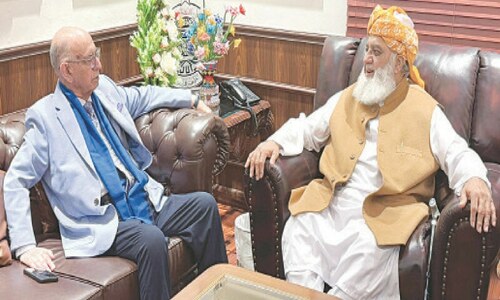 BOGOTA, July 3: Commandos dramatically rescued Colombian-French politician Ingrid Betancourt and 14 other hostages from six years of captivity on Wednesday by posing as their Marxist rebel captors and flying them out of their jungle prison by helicopter.
BOGOTA, July 3: Commandos dramatically rescued Colombian-French politician Ingrid Betancourt and 14 other hostages from six years of captivity on Wednesday by posing as their Marxist rebel captors and flying them out of their jungle prison by helicopter.
Betancourt, a dual Colombian-French citizen and former presidential candidate, and her campaign manager Clara Rojas had been taken hostage by a left-wing guerilla group, the Revolutionary Armed Forces of Colombia (Farc), on Feb 23, 2002. Betancourt was the guerrilla group’s most high-profile captive.
Rojas was released in January.
Betancourt’s two children were flown to Colombia from France aboard a French government plane on Thursday morning to meet their mother.
The former presidential candidate embraced her children for the first time in six years, saying the thought of them had helped her stay alive through “hell and despair”.
Contrasting her new-found freedom with the hopelessness of captivity, she said: “Nirvana, paradise _ that must be very similar to what I feel at this moment,”
Betancourt fought back tears as her son reached over to kiss her. “It was because of them that I kept up my will to get out of that jungle.”
“The last time I saw my son, Lorenzo was a little kid and I could carry him around,” she said. “I told them, they’re going to have to put up with me now, because I’m going to be stuck to them like chewing gum.”
The 19-year-old, Lorenzo Delloye, said it was “an indescribable joy” to hear that his 46-year-old mother was free.
He and his sister Melanie, 22, who have grown up without their mother, had left France for Bogota late on Wednesday with French Foreign Minister Bernard Kouchner and other family members.
Betancourt paid tribute to the international efforts to end her six years in captivity and admitted even she had been taken in by the army operation late on Wednesday which also freed three US defence contractors and 11 Colombian soldiers.
“To all of you Colombians, for all of you French who have been with us, that accompanied us in the world, that helped us to remain alive, that helped the world to know what was going on: thank you,” Betancourt said.
AUDACITY AND DECEPTION: She said the hostages did not know that rebels who had come to move them to a new hideout were Colombian soldiers in disguise, noting some wore T-shirts bearing the portrait of legendary revolutionary Ernesto Che Guevara.
The disguised soldiers made the hostages board a helicopter with their wrists bound, saying they were being transferred to a new base of the Farc guerillas.
“It was only when we were in the air that the chief of operations said ‘we are the national army and you are all free’,” Betancourt said after arriving at Bogota’s military airport.
“And the helicopter almost fell because we started jumping. We screamed, we cried, we hugged. We couldn’t believe it.”
Looking at helicopter’s crew, Betancourt reasoned they weren’t aid workers, as she’d expected _ but rebels. This was just another indignity _ the helicopter “had no flag, no insignia”. Angry and upset, she refused a coat they offered as they told her she was going to a colder climate.
But not long after the group was airborne, Betancourt turned around and saw the local commander, alias Cesar, a man who had tormented her for four years, blindfolded and sitting on the floor.
The stunning caper involved months of intelligence gathering, dozens of helicopters on standby and a strong dose of deceit: the rebels shoved the captives, their hands bound, onto a white unmarked Mi-17 helicopter, believing they were being transferred to another guerilla camp.
The helicopter crew were soldiers in disguise. Cesar and the other guerilla aboard had been persuaded to hand over their pistols, then overpowered.
As she descended from the plane looking fresh and happy, dressed in an army camouflage vest and hat, Betancourt embraced her mother, Yolanda Pulecio, and praised the “perfect operation” that had freed her.
Colombian Defence Minister Juan Manuel Santos said the rescue, made possible by a military agent’s infiltration of the rebels, “will no doubt go down in history for its audacity”.
US ambassador to Bogota William Brownfield told CNN that Washington had provided “technical support” to the operation, but Santos insisted it was a “one hundred per cent Colombian” effort.
Speaking in French and Spanish, Betancourt thanked everyone for keeping their plight alive.
“We were able to dream. We were able to keep hope alive because we heard our loved ones” on the radio, she said.
US hostages Marc Gonsalves, Thomas Howes and Keith Stansell, captured in 2003 when their plane crashed during a US defence department anti-drug mission, arrived back in the United States early on Thursday.
The men, employees of US defence contractor Northrop Grumman, landed at a military base in San Antonio, Texas, and were taken by helicopter to an army medical centre.
CELEBRATIONS: World leaders hailed the release and celebrations broke out on the streets of Colombian cities to mark the brazen jungle rescue as a bright spot for a country plagued for decades by kidnappings.
Colombian President Alvaro Uribe, who spoke with Betancourt just after her release, praised the “magnificent work” of the rescue team and compared the operation “to the greatest epics in the history of man”.
US President George Bush congratulated Colombia, telling Uribe he was a “strong leader”, while French President Nicolas Sarkozy also thanked Uribe and called on the Farc to end their “absurd” struggle.—Agencies















































Dear visitor, the comments section is undergoing an overhaul and will return soon.